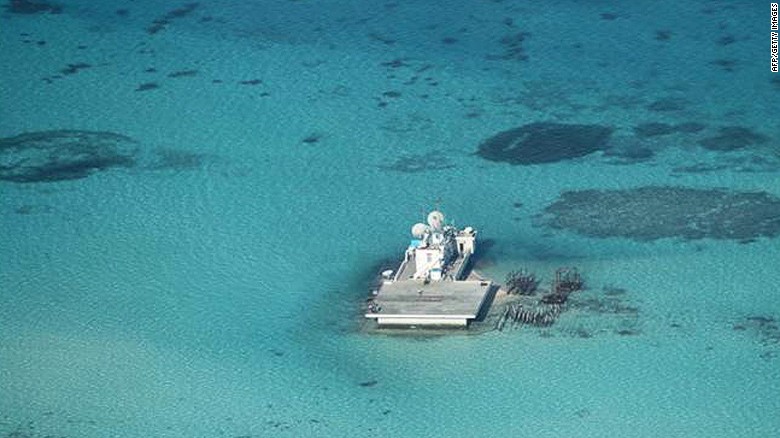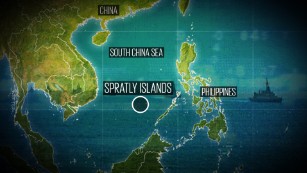U.S. defense chief to China: End South China Sea expansion

Island built onto a reef in a large-scale reclamation by China
Story highlights
- U.S. "deeply concerned" about Beijing's activities in South China Sea
- State-run media: Claims of Chinese militarization "sensationalized" by West
(CNN)As China rapidly builds new artificial islands in the South China Sea to expand its territory claim there, Washington is adamantly refusing to recognize those claims.
On Saturday, U.S. Defense Secretary Ash Carter called for "an immediate and lasting halt" to the practice.
"The United States is deeply concerned about the pace and scope of land reclamation in the South China Sea," Carter said in a speech before diplomats in Singapore. "The prospect of further militarization as well as the potential for these activities to increase the risk of miscalculation or conflict among claimant states."
Carter's Australian and Japanese counterparts weighed in with similar statements as well on Saturday, but a Chinese defense official fired back, dismissing concerns over militarization as "incomplete and (lacking) jurisprudential evidence."
"Freedom of navigation should be for the benefits of economic development, rather than sending military aircraft and vessels everywhere," Rear Adm. Guan Youfei said of Carter's speech to state-run news agency Xinhua.
Militarization
Last week, a U.S. surveillance plane carrying a CNN crew swooped over such artificial islands, triggering eight warnings from the Chinese navy to back off. U.S. officials are concerned about China's militarization of some of the islands and is trying to create public awareness of it, but Chinese media slammed the issue as being manufactured and "sensationalized on purpose" by the West.

Chinese military confronts U.S. spy plane 06:20
As reported in Xinhua, Huang Jing, the director of the Center on Asia and Globalization at the National University of Singapore, said that "(t)he South China Sea issue has been there for decades. Why was it not a big issue previously, but (is) one now? In some sense, the South China Sea issue was sensationalized on purpose."
Fear of conflict
Anger has simmered over the South China Sea among China and neighboring countries, such as Vietnam and the Philippines, which have argued about existing territorial claims and mineral rights underneath them.
Some of those nations have also built up a few new artificial islands as well.
But of the governments participating in land reclamation, Carter singled out Beijing for particular criticism.
"One country has gone much further and much faster than any other, and that's China. China has reclaimed over 2,000 acres, more than all other claimants combined and more than in the entire history of the region. And China did so in only the last 18 months." Many of China's artificial islands are much closer to other countries' mainland shores than they are to its own.
Carter called for an immediate stop to land reclamation by all nations and a stop to the militarization of the existing ones.
Former CIA Deputy Director Michael Morell told CNN this week that the confrontation could "absolutely" present a risk of the U.S. and China going to war sometime in the future.
The U.S. is considering flying surveillance missions closer than it has before over the islands, as well as sailing U.S. warships within miles of them, as part of the new, more robust U.S. military posture in the area.
It is part of President Barack Obama's strategic and economic "pivot to Asia" policy.
Although he expressed concerns over possible conflicts, Secretary Carter said solutions are limited. "We all know there's no military solution to the South China Sea disputes," he said.
He called for renewed diplomacy.

No comments:
Post a Comment